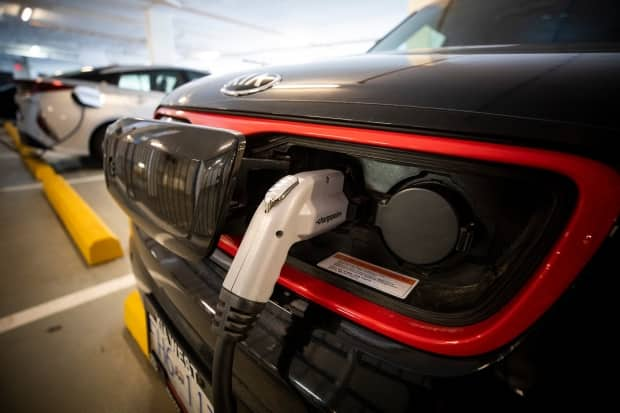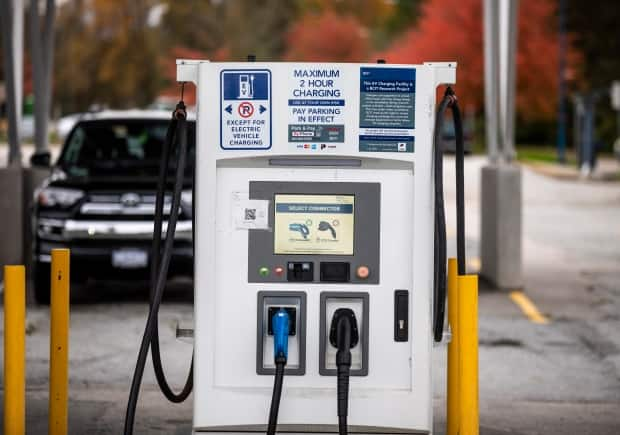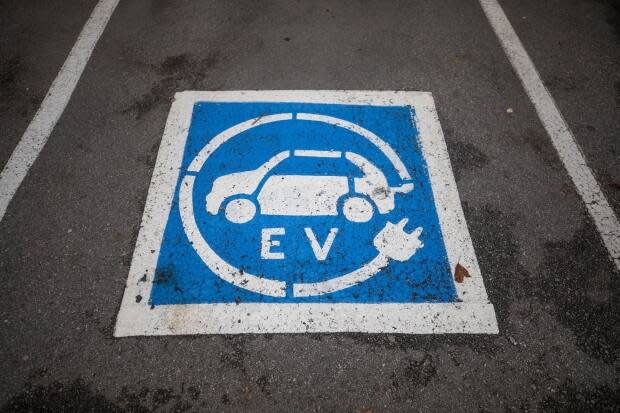Lack of charging stations in B.C. condos impeding use and purchase of electric vehicles

Drivers in British Columbia are keener than ever to buy electric vehicles, but the lack of charging stations in condo buildings is a major impediment.
That's one of the findings of a report that was discussed at the Metro Vancouver Climate Action Committee on Friday. The report found that, although adoption of electric vehicles is key for the region to reduce its carbon emissions, there currently isn't enough infrastructure in multi-residential buildings to support drivers wanting to charge them at home.
In Vancouver alone, 62 per cent of homes surveyed in the 2016 census were apartments.
University of British Columbia business professor Werner Antweiler is familiar with the struggles of installing charging stations from scratch.
Antweiler, who researches environmental economics, including electric vehicle adoption, helped to retrofit his 61-unit building to include charging stations for about a third of the units. He says the process took three years from start to finish.
"I was officially professionally interested and nerdy enough to actually have enjoyed the process," he said. "But it took a lot of effort from a couple of really dedicated people to make it happen."

First, the changes had to be approved by a 75 per cent majority of the building's owners at a special meeting of the strata — the committee of volunteer owners that govern most privately-owned apartments in B.C. The strata's bylaws had to be changed to allow those who needed the extra power to pay for it themselves directly.
Then, they had to hire a contractor to figure out if their 15-year-old building could even handle the extra power needs. Along the way were myriad other technical challenges and decisions that had to be figured out.
While the strata paid a nominal amount for a feasibility study, the 25 condo owners who got a charging station in their parking spot each paid between $3,000 and $6,000. Antweiler says they're hoping to recoup 50 per cent of those costs through the province's EV charger rebate program, which closed Feb. 28 but is likely to be renewed.
"We need to have charging essentially close to home to make it an interesting proposition for car owners," Antweiler said. "And we're still far away from getting us to that point, because the infrastructure we currently have for public charging ... is still pretty sparse."
B.C. Hydro says there are 2,500 public charging stations throughout the province and more on their way this year.
As for the rebate program, it says, by the end of 2020, 377 EV charging stations had been installed in condo and apartments buildings since 2018.
All EVs in B.C. by 2040
British Columbia is aiming to have all personal vehicles on the road be electric by 2040.
Electric vehicles are selling in record numbers in the province, and a recent survey from KPMG suggests that 68 per cent of Canadians who plan to buy a new vehicle in the next five years are likely to buy electric.
And car manufacturers are increasingly onboard with building more electric models. In 2019, Volkswagen pledged to make all of its vehicles electric by 2026.
Tony Gioventu, executive director of the Condominium Home Owners Association of B.C., says most stratas are willing to install charging stations but face multiple challenges.
Gioventu says even some newer buildings on the market aren't equipped to accommodate charging stations — either because of the way their power is distributed or because their bylaws assign specific parking stalls to units.
"It isn't just that there's a reluctance or resistance," he said. "It's just really daunting."

Government support and regulations
Some municipalities have mandated that all new buildings have the capacity to accommodate charging stations, and Gioventu says he would like to see more of those types of regulations.
But that still leaves a lot of buildings that don't have the right infrastructure in place, and a volunteer committee to figure out how to navigate the regulations in place to upgrade it.
Luckily, Gioventu says, there are companies that can help move the process along. But it still takes six months to two years for charging stations to be installed.
What Gioventu would like to see is a rebate program that helps entire buildings restructure their electrical systems rather than a piecemeal approach that funds individual drivers.
"In the long term it would be substantially less expensive rather than individual stations being modified," he said.
BC Hydro says if the rebate program is approved again in this year's budget, it would include a separate program for condo and apartment buildings to fund assessment, infrastructure development and installation of electric vehicle charges.

